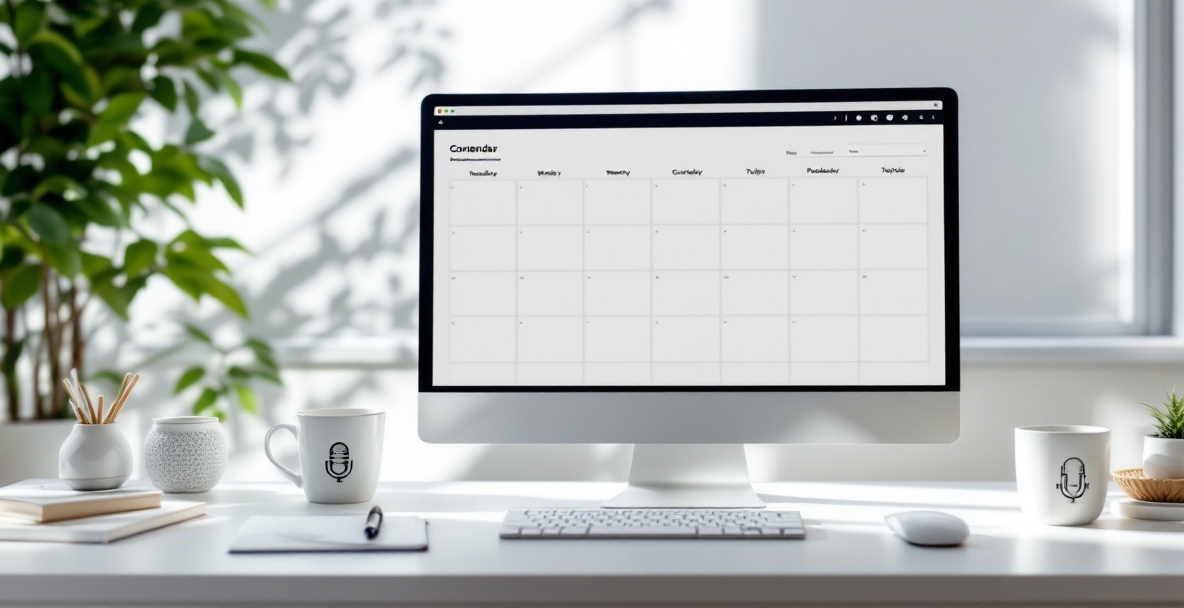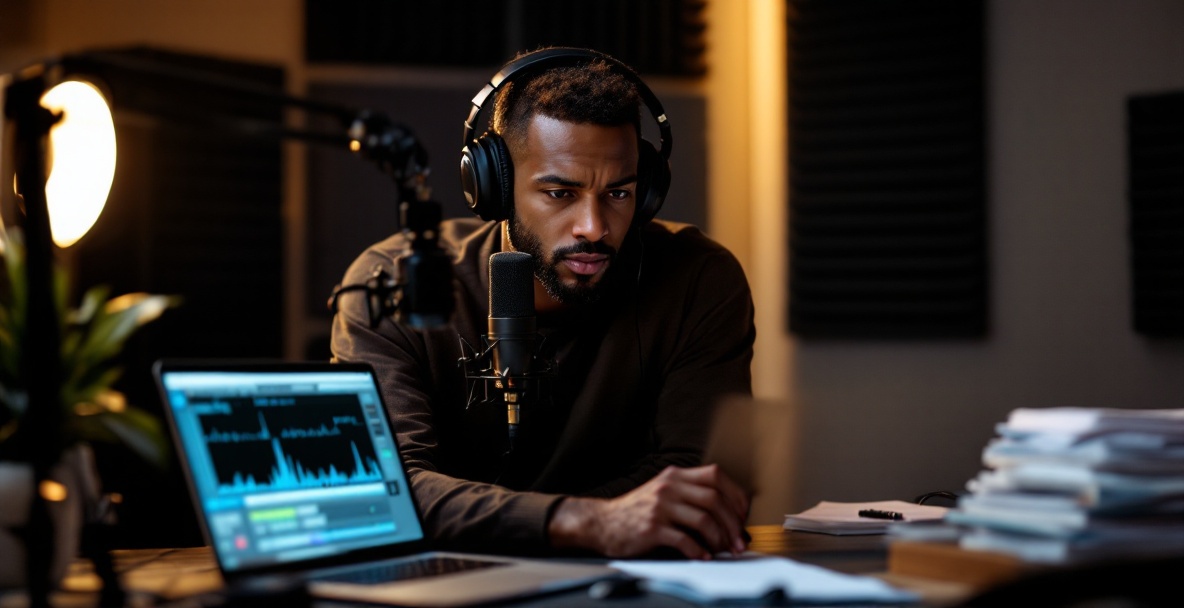Planning your podcast content can be a game-changer if you get it right. A well-thought-out plan stops you from scrambling for topics and helps you connect with your listeners on a steady basis. We at Castee have seen shows transform from chaotic beginnings to fan favorites simply because they had a clear roadmap. With the right plan in place, every episode has purpose and you can breathe easier knowing you’re ready for each recording session.
Why You Really Need a Podcast Game Plan

The podcast scene is crowded, with over 2 million active podcasts vying for listener attention. That means standing out is more than just having a good idea; it calls for a solid strategy behind your episodes. When you work out a clear content plan, you build a consistent connection with your audience. Every episode becomes part of a larger conversation that keeps them tuning in again and again.
Why It Is Hard to Keep a Steady Schedule
Regularity builds trust. When your listeners know your show drops on a certain day, they make you part of their routine. But sticking to a schedule is often tougher than it sounds. Without a clear plan, you might face those stressful gaps when you scramble for a topic at the last minute. Many podcasters burst with energy at first only to hit a creative wall later. A solid content roadmap ensures you always have a topic lined up, even on days when inspiration is hard to find.
Finding the Path for Your Podcast
Planning out your episodes is much more than filling dates on a calendar. It is about crafting a compelling story that spans across episodes so your audience can follow your journey easily. Without this focus, your show risks feeling random and unplanned. A thoughtful plan acts like a guide, keeping each episode connected while allowing you to mix things up and keep the content fresh. Listeners notice when the flow is natural and when every episode has a purpose.
Kick Off: Figure Out Why Your Podcast Exists

Before plotting out episodes, take a moment to get clear on why you are doing this. Your podcast’s purpose is your north star, guiding every choice you make-from topics to guest invitations. Ask yourself if your show is meant to educate experts, entertain through storytelling, or build a community around a shared interest. At Castee, we suggest writing a single sentence that captures what makes your show special. For instance, you might say, "The Marketing Mindset podcast gives small business owners smart, low-cost marketing tips and expert advice." This clarity sets the stage for every decision that follows.
Pinpointing Your Unique Corner
It is easy to get lost in a sea of general interview shows. Instead, focus on a specific niche that fits your passion and expertise. What is that unique flavor only you can bring? Maybe you are a coach with personal tips on relationship advice, a restaurant owner who champions sustainable foods, or a teacher with fresh ideas about digital learning. When your podcast has a clear focus, it stands out and gives you endless ideas to keep your show interesting and fresh.
Knowing Who Listens
Understanding your audience is a key part of planning. When you think about who is tuning in-what they do every day, their struggles, and their interests-you can design episodes that speak directly to them. The clearer your picture of your listeners, the easier it is to create topics that truly hit home. Podcasters who know their audience well tend to offer actionable insights that address real-life problems, turning guesswork into deliberate and strategic communication.
Creating a Content Calendar: Your Podcast Roadmap

A content calendar turns your ideas into specific plans and stops you from rushing last minute. Planning your episodes 4-6 weeks ahead means you know exactly what to record, when to invite guests, and how to spread the word about your show. At Castee, we like to use simple calendar templates that mix solid structure with room for spontaneous ideas. The best calendars not only list topics but also note key points, research areas, and ideas for promotion. This detailed approach makes sure nothing slips through the cracks and that you have a constant flow of engaging content.
Finding Topics That Truly Connect
Picking the right topics is where knowing your audience really pays off. The best episodes answer genuine questions and tackle issues listeners care about. Start by jotting down every idea that comes from your own expertise, audience feedback, and even industry trends highlighted in podcast statistics. Ask yourself if each idea fits with your podcast’s main goal, if it will deliver real value to your audience, and if you have the expertise or guest resources to explore it well. This careful check makes sure every episode adds meaning to your show instead of feeling repetitive.
Deciding How Often You Hit Record
Figuring out how often you publish is a balancing act between what your listeners expect and what you can realistically produce. Some advice points to weekly shows as a good way to keep engagement high, yet many creators thrive on bi-weekly or monthly releases. The key is to choose a schedule that feels natural and upholds quality without overwhelming you. As you draw up your calendar, keep in mind busy periods like holidays or major events that might affect your workflow. A little extra buffer time makes it easier to stick to your plan and satisfy your audience.
Making Podcast Production a Manageable Routine
To keep your production routine from feeling overwhelming, try grouping similar tasks together. Many podcasters find it effective to set aside one day for brainstorming and research, another for recording a batch of interviews, and yet another for editing the content. Working this way helps you manage your time and avoid creative burnout. It also works well to have recurring themes so that your audience knows what to expect. For example, you might spend one episode on industry updates, another answering listener questions, a third featuring an interview, and a fourth diving deep into a specific topic. This familiar routine makes planning easier and enriches your content over time.
Creating Episodes That Stick: The Art of Engaging Content

Great podcast episodes mix a good plan with real, genuine moments that captivate listeners. When you prepare well and speak naturally, your show feels both polished and approachable. We have seen that when creators focus on giving actionable insights and keep their conversation on track, the audience stays engaged. This means starting strong, keeping off-topic chatter to a minimum, and offering clear value right from the opening line through to the last word.
Giving Your Episodes a Clear Shape
Even the most laid-back podcasts benefit from a bit of structure. A familiar format helps your audience know what comes next and stay engaged. Usually, a memorable episode kicks off with an interesting hook that explains its value, moves into a well-organized middle, and ends with a wrap-up that reinforces the key ideas. Sketch out your segments and plan roughly how long each part should last. This approach not only keeps you organized but also helps your audience follow along without missing a beat.
Listening to What Your Audience Has to Say
The best podcasts grow by truly paying attention to listener feedback. When you make an effort to collect and act on comments, you can fine-tune your show to better match your audience’s needs. Let your listeners share their thoughts by email, social media, or voice messages. When you hear what resonates and what could be improved, you can shape future episodes to offer practical solutions that matter. Mentioning feedback on air shows that you value their input and are committed to making the show even better.
What Turns a Good Episode into an Unforgettable One?
Some episodes stay with you long after you listen. They introduce fresh ideas or a new way of looking at things that spark conversation. To create these standout moments, mix in personal stories and examples that illustrate your points. When you share real-life experiences, your content becomes more relatable and memorable. Look for those gold moments that give your listeners an "aha" feeling, and you will build episodes that people love to share.
Wrapping Up: Step Forward with Confidence
Good planning turns podcasting from a last-minute rush into a steady, enjoyable process. When you know your purpose, understand your audience, set up a clear content calendar, and design episodes that keep listeners hooked, you pave the way for long-term success. Remember, planning is not about locking in every little detail; it is about creating a framework that lets your creativity shine every time you record.
What You Can Do Next
Start by nailing down the core reason behind your podcast and sketching a clear picture of your ideal listener. Then, map out a simple content calendar for the next month with topics that match both your strengths and your audience’s needs. Stick to a schedule that feels realistic and tweak it as you learn what works best. Use feedback and your personal experiences to fine-tune your approach. Keep refining your plan as you go, and every episode will build upon the last.
Connect with Fellow Podcasters
No podcaster should have to figure it all out alone. Teaming up with other creators can spark new ideas, offer honest advice, and give you the support you need when times are tough. At Castee, we have built tools specifically designed to simplify your podcast marketing and grow your show’s impact. Ready to transform your podcast content planning and grow your audience? Visit Castee today to discover how our end-to-end podcast marketing solution can help you boost visibility, engage followers, and track your success through our specialized analytics tools. Let us help you amplify your voice and build a thriving community around your podcast.
Leave a Reply